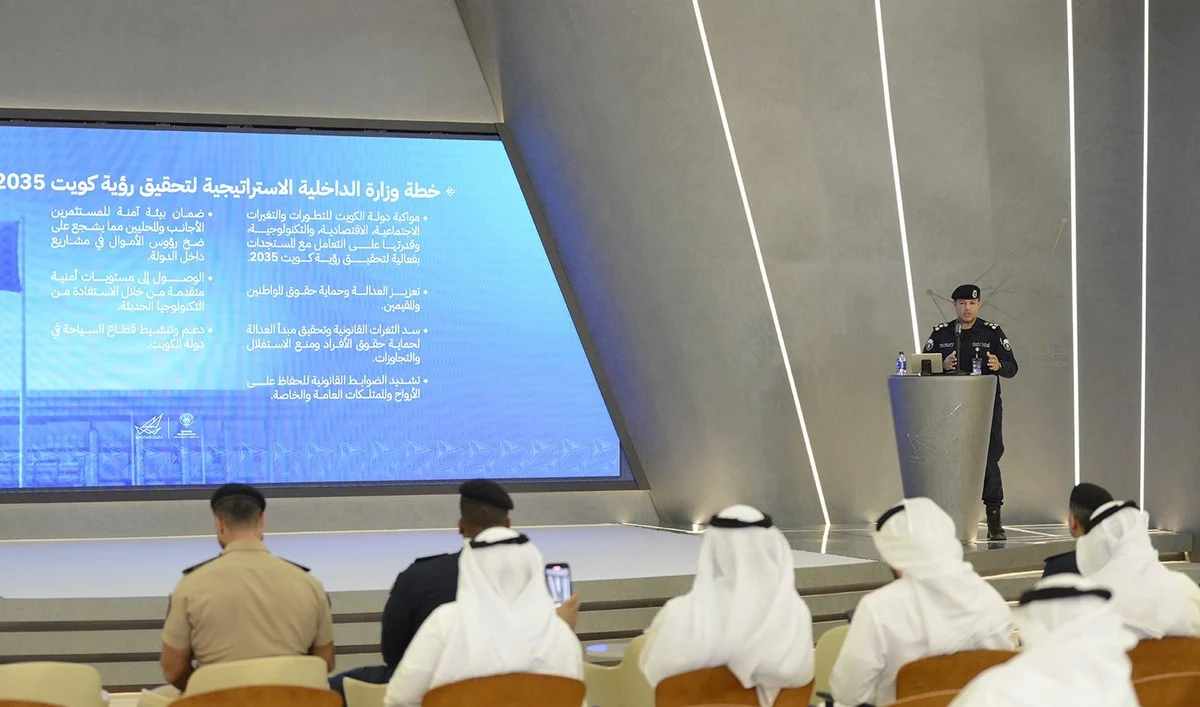30/07/2025
30/07/2025

KUWAIT CITY, July 30: The Ministry of Interior (MoI) is actively advancing its security framework to keep pace with modern developments and align with the long-term goals of the “New Kuwait 2035” vision, Brigadier Nasser Abu-Slaib, the official spokesman for the ministry, confirmed on Tuesday.
During a detailed presentation titled “Laws – Numbers – Achievements 2025,” Abu-Slaib reviewed the MoI’s comprehensive strategic plan, highlighting key legislative amendments to traffic, residency, and narcotics laws, as well as the ministry’s ongoing digital transformation efforts. The “Sahel” unified government application now provides 37 electronic services, facilitating more than 30.8 million transactions, underscoring the shift towards seamless digital governance.
A significant milestone is the biometric fingerprint project, which has compiled a database exceeding 16 million individuals. This biometric system is fully integrated with various state ministries, streamlining identity verification processes and bolstering border security.
Abu-Slaib elaborated on the new drug law currently under development, designed to curb narcotics use and trafficking by imposing stricter penalties and expanding law enforcement powers. In the first half of 2025, authorities recorded 1,451 drug-related cases and 11 fatalities linked to substance abuse.
The MoI also launched the electronic visa platform, KUWAIT VISA, which simplifies the process of obtaining various types of entry permits, including tourist, family, business, and government visas.
Innovation in maritime security was another highlight, with the Kuwait Coast Guard unveiling smart unmanned boats capable of operating autonomously for extended periods. These vessels enhance maritime surveillance, support search and rescue missions, monitor environmental pollution, and reinforce the security of Kuwait’s territorial waters.
Abu-Slaib also discussed the recently enacted Kuwaiti Flag Law, aimed at protecting the national emblem’s dignity. The law regulates flag usage during events, prohibits unauthorized display of foreign flags or sectarian slogans, and forbids raising torn or damaged flags, promoting national unity and respect.
Brigadier Abu-Slaib emphasized that the MoI’s strategic plan is designed to adapt to evolving social, economic, and technological realities. The plan seeks to promote justice, safeguard the rights of citizens and residents, close legal loopholes, and foster equality while protecting against exploitation and violations.
The strategy also prioritizes creating a secure and investor-friendly environment, which will stimulate capital inflows into development projects and strengthen Kuwait’s tourism sector. Additionally, the plan includes enhancing legal controls to protect lives and property, supported by advanced technological tools.
Regarding the biometric fingerprint initiative, Abu-Slaib noted that Kuwait now maintains 16,371,153 civil fingerprints covering citizens, residents, and visitors. A separate database includes records of citizens, residents, illegal residents, and visitors totaling 5,381,457 individuals. This project reduces identity fraud, expedites transactions, and improves the detection of wanted individuals at borders and airports.
In digital transformation, the MoI’s “Sahel” app has revolutionized service delivery, enabling citizens and residents to complete thousands of transactions without in-person visits. The platform will soon incorporate additional digital services from the ministry.
The presentation also highlighted the transformative impact of residency law amendments and digital upgrades on the Residency Affairs Departments. The new law aligns with labor market needs, strengthens the economy, protects worker and employer rights, defines clear obligations, and combats human trafficking with strict penalties. These measures enhance Kuwait’s international reputation and support its status as a global financial hub.
Abu-Slaib detailed the pending amendment to the Narcotics and Psychotropic Substances Law, aimed at restricting drug trade and abuse. The law grants wider powers to security agencies to dismantle trafficking networks and includes integrated prevention, treatment, and rehabilitation plans. In 2024, 39 deaths were attributed to narcotics, while the first half of 2025 saw 1,451 cases, 261 addiction complaints, 1,864 defendants, and 11 deaths, highlighting the urgency of these reforms.
Regarding maritime security, the General Directorate of Coast Guard has made a significant leap by deploying smart unmanned marine boats. These vessels perform continuous reconnaissance, track suspicious targets, assist search and rescue operations, monitor environmental threats, and enhance security in Kuwait’s territorial waters without direct human control for extended durations.
On traffic safety, Abu-Slaib reviewed amendments imposing harsher penalties for serious violations such as speeding and running red lights. Technological tools including artificial intelligence cameras and smart apps are used to enforce laws effectively. Since the new traffic law took effect on April 22, 2025, speeding and red-light violations have dropped by 83%, seatbelt and mobile phone infractions by 75%, and traffic-related deaths by 55%. The amendments also fostered a culture of road safety, reducing daily accidents from approximately 300 in 2024, 90% of which were caused by distractions.
Finally, Abu-Slaib addressed the amendments to the Kuwaiti Flag Law issued on June 8, which safeguard the national symbol from misuse. The law prohibits raising foreign flags without a permit, except during international sports events in Kuwait. It also bans continuous display of the national flag on private buildings or commercial use, forbids raising the flag if damaged, and restricts flags or slogans with religious, sectarian, or tribal meanings, except for official sports club logos.
The Ministry of Interior’s multifaceted strategic plan underscores its commitment to safeguarding Kuwait’s security, promoting justice, and supporting the nation’s vision for 2035.


